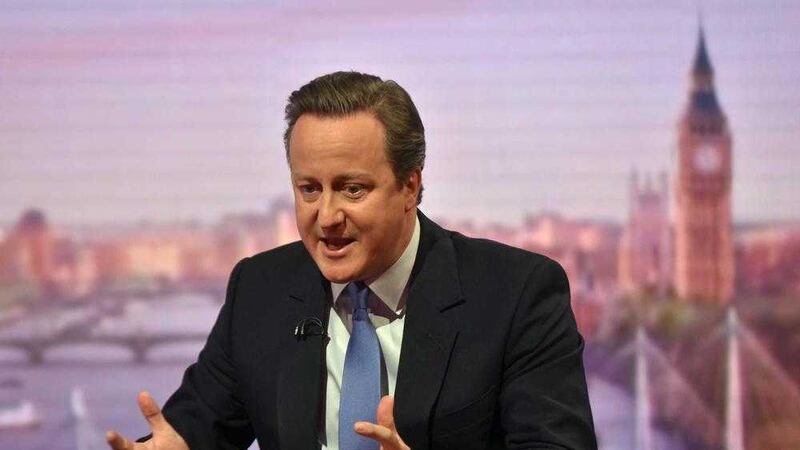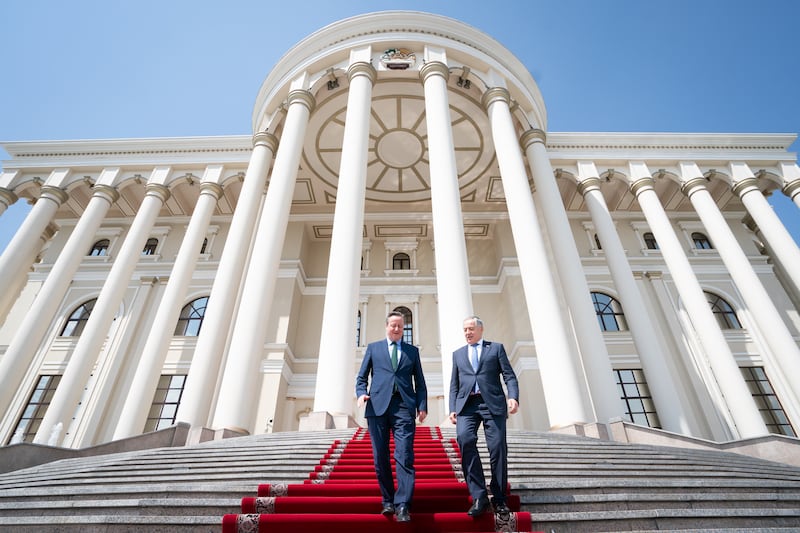DAVID Cameron said he had a duty to spell out the economic risk of leaving the EU as he was accused of trying to "bully and frighten" voters by warning the state pension could be squeezed.
The prime minister said the strain on the public finances caused by Brexit would threaten the end of the "triple lock" guarantee for OAP payments and protections for health and defence funding.
With just 10 days until the referendum vote he conceded that it remained a "very lively and very full debate" amid claims of panic in the Remain camp.
But he said the pro-EU side "have the most confident and the most positive case that we can carry on making this country greater if we stay in".
Ukip leader Nigel Farage downplayed the economic implications of victory for Vote Leave, suggesting some short-term turbulence could be beneficial and dismissing claims the pound was already under pressure.
"Since Brexit became a possibility, sterling is up and FTSE is exactly the same level it was in March. These are ludicrous scare stories that are being put out," he told BBC1's Andrew Marr Show.
"Even if Sterling were to fall a few percentage points after a Brexit, so what? The point is we have a floating currency and it would be good for exports."
Mr Cameron hit back: "I'll tell you 'so what'. If the pound falls then that means the prices in our shops go up, the weekly shop costs people more, that family holiday costs more. These are all risks we should avoid and we shouldn't risk it."
He told the show: "I totally accept that people are confused by having so many statistics and that there is a lot of frustration because of that.
"But I think it is actually my job as prime minister, when you have got information coming from independent forecasters... to talk about those risks and it would be very irresponsible not to."
Backing Brexit was voting for the first self-inflicted recession, he said.
The Remain camp sought to press home its central message of likely economic turmoil in the event of a vote to quit the bloc on June 23 amid signs of a hardening of public opinion against the EU.
Labour said a post-Brexit squeeze on the public finances could result in charges for GP appointments and NHS hospital stays.
Amid concerns the party's core support is being drawn increasingly towards a Leave vote, the Opposition is stepping up warnings of the prospect of the country being run by a right-wing Eurosceptic Conservative government.
Shadow health secretary Heidi Alexander said: "If we leave Europe, most experts agree that the economy will suffer and this would mean an even deeper black hole in NHS finances.
"This translates into staff cuts, service closures or charges being introduced.
"A post-referendum government led by Boris Johnson could mean people turning up at A&E or to see their GP and having to reach for their credit cards. I don't think that's right and I don't think many patients do either.
"The leave camp needs to come clean with the British public and admit a vote to leave Europe puts the NHS at risk."
Clare Gerada, a GP and former chairwoman of the Royal College of General Practitioners, added: "Boris and his friends don't believe in our National Health Service and would jump at the chance to make people have to pay to use it.
"That would be bad for patients and bad for the nation's health. It would also mean more administrative work for already overstretched staff."
Meanwhile, Labour's shadow chancellor John McDonnell blasted both sides of the EU referendum campaign as he spoke to the Peston On Sunday programme on ITV.
He said: "I think I'm where most people are at at the moment in terms of I'm fed up of 'Project Fear' on both sides.
"I think what's been happening is there have been exaggerated claims on both sides and that's turned people off."
Mr McDonnell was asked if Mr Cameron was wrong to claim that public services could be cut if the UK backs Brexit.
He said: "It is true that there are risks to our economy because our economy is fragile and I blame the Tories for it being so fragile."
He added: "I do not want anything putting people's pensions at risk and there could be that risk – this is a big leap in the dark."
Commons leader and prominent Brexiteer Chris Grayling rejected the idea that the Tories would be unable to deliver key manifesto pledges relating to public services if the UK votes to leave the European Union.
"I don't buy the argument," he said.
"You have to remember the prime minister, I'm afraid to say I completely disagree with him on this, it is only about six months since he was telling us if we chose to leave the European Union we would do fine, we would do well."
He also suggested it was wrong for the prime minister and the Remain camp to suggest that things like pensions and defence spending could be affected by a Leave vote.
He said: "I'm very surprised he has chosen to use those examples. I don't believe that's right. I don't believe we would back away from our manifesto promises and I don't believe we would need to."








